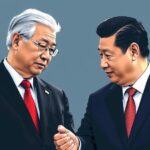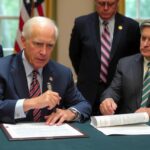Politics
ASIA, BIDEN ADMINISTRATION, CHINA, DAVOS, DEFENSE DEPARTMENT, DONALD TRUMP, EUROPE, EUROPE/ASIA, FOX NEWS, GEOPOLITICS, INTERNATIONAL RELATIONS, IRAN, MEXICO, NORTH AMERICA, NUCLEAR POLICY, NUCLEAR WEAPONS, PUTIN, RUSSIA, RUSSIA-UKRAINE WAR, SEAN HANNITY, SERGEY LAVROV, SWITZERLAND, TRUMP, U. S, UKRAINE, UNITED STATES, VLADIMIR PUTIN, WASHINGTON, WORLD ECONOMIC FORUM
Dante Raeburn
Examining Trump’s Denuclearization Proposal with Russia and China
President Trump has proposed denuclearization talks with Russia and China amid his administration’s early actions, aiming to alleviate financial burdens and enhance relations. However, skepticism remains regarding compliance, especially from Russia, which recently suspended the New START treaty, and China’s absence from arms negotiations complicates the prospect of substantive agreements. Maintaining a strong U.S. deterrent strategy in the face of growing nuclear threats is essential as discussions progress.
President Donald Trump recently proposed discussions on “denuclearization” with adversaries Russia and China during critical moments in his administration. At the World Economic Forum, he emphasized the financial burden associated with nuclear arms and expressed optimism about the possibility of such talks. This idea could suggest a significant improvement in U.S. relations with both countries, though skepticism remains regarding their reliability in honoring agreements.
Russia’s involvement in arms control has been contentious, as President Vladimir Putin announced a suspension of the New START treaty due to U.S. actions concerning Ukraine. Simultaneously, China’s approach to nuclear negotiations has been nonexistent. Trump has claimed previous proximity to a denuclearization agreement with Russia during his first term but acknowledged the disruption caused by the 2020 presidential election.
Recent assessments predict that China’s nuclear arsenal may nearly double, heightening concerns about arms proliferation. Russian officials have expressed reluctance to engage with the U.S. under present tensions, complicating prospects for substantive negotiations. China’s representatives insist that their nuclear strategy reflects a commitment to peaceful development, although experts view Russia’s maneuvers as tactical and opportunistic, particularly regarding Ukraine.
Past arms control efforts, such as Trump’s meetings with North Korea, were met with challenges, highlighting the delicate nature of such negotiations. The ongoing costs associated with maintaining the U.S. nuclear arsenal—expected to reach $756 billion in the next decade—underscore the necessity for modernization./ Meanwhile, maintaining oversight on compliance with treaties remains a significant concern, particularly with potentially aggressive competitors like North Korea and Iran involved.
Strategically, the U.S. must approach any arms control discussions with a clear deterrent policy against peer competitors, incorporating the complexities of global nuclear dynamics. A century of nonproliferation agreements has evolved into a multifaceted challenge, making bilateral agreements less effective while the number of nuclear-armed countries increases.
Ultimately, Trump’s denuclearization initiative opens the door for diplomatic dialogue, but practical execution remains uncertain, necessitating strategic foresight and engagement with multiple nuclear-armed nations to safeguard U.S. interests. The commitment to arms reduction faces significant hurdles ranging from geopolitical hostilities to complex compliance verification.
The topic of denuclearization has gained prominence, particularly in discussions involving the U.S., Russia, and China. Despite various historic treaties aiming towards nuclear arms control, ongoing tensions and the evolving nuclear capabilities of different nations threaten to undermine previous agreements. Understanding the implications of these discussions is critical for fostering global stability and recognizing the financial and political intricacies surrounding nuclear arsenals on an international scale.
In conclusion, President Trump’s call for denuclearization talks with Russia and China presents an opportunity for improving relations, albeit fraught with challenges stemming from historical compliance issues and geopolitical rivalries. The necessity for an updated strategic approach to nuclear arms control is paramount as the international landscape evolves. Ensuring a reliable framework for discussions could provide pathways for reducing global nuclear threats, but requires maintaining a vigilant stance on compliance and verification.
Original Source: www.foxnews.com








Post Comment